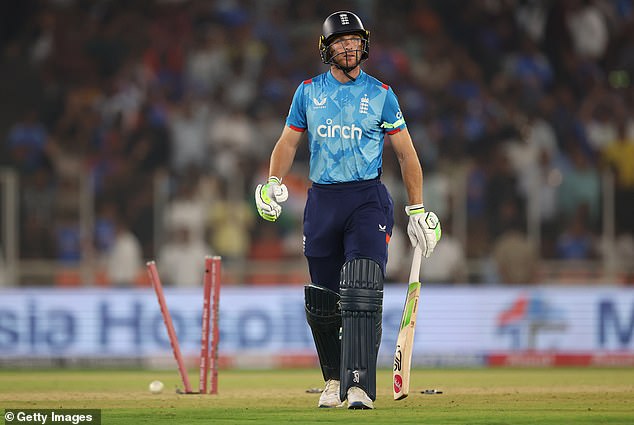England’s Challenging Champions Trophy Campaign
When England kicks off their Champions Trophy campaign against Australia in Lahore on February 22, it is clear that they will not be shouldering the nation’s hopes as they did in 2019. Just six years ago, under the leadership of Eoin Morgan, England’s white-ball team was the epitome of fitness and finesse, and they were the favored team heading into the World Cup. The dramatic victory at Lord’s, where they clinched the trophy, remains one of the most cherished moments in English cricket history. However, the contrast with the current team, led by Jos Buttler, is stark. In just 18 months, England has plummeted from the heights of being double world champions to becoming also-rans, suffering a dismal record of seven defeats out of eight in India, some by embarrassing margins.
A Shaky Start Under New Leadership
The recent poor performances in India have raised significant doubts about England’s chances in the Champions Trophy. It is only been a year and a half since Brendon McCullum took the helm as head coach across all formats, and his tenure started with a bang in the Test series with the aggressive Bazball strategy. However, the results in the white-ball formats have been mixed at best. The accusation of a lack of practice and a preference for golf over cricket, fueled by comments from former players like Ravi Shastri and Kevin Pietersen, has added to the pressure. Buttler has had to address these concerns, emphasizing that the team is not lazy and is committed to putting in the effort. McCullum, known for his optimistic outlook, has maintained his faith in the team, stating, “If you go the other way, you’ve got no chance, right? I have belief in us.” Despite his pedigree and track record, the team’s recent form in India underlines the challenges they face.
Group Dynamics and Historical Context
England’s group in the Champions Trophy includes formidable opponents like South Africa and Afghanistan, both of whom have caused England significant trouble during the 2023 World Cup. While the flat pitches in Lahore and Karachi are likely to favor England’s batsmen and the pace of their bowlers, the team’s confidence is a major concern. The 3-0 whitewash in India and a 4-1 defeat in the T20s have left the team in a precarious position. Since the 2019 World Cup, England has lost more ODIs (32) than they have won (29), and a significant portion of their wins have come against less challenging teams like Ireland, the Netherlands, and Bangladesh. Against major competitors like Australia and India, their record is particularly poor, with only three wins against Australia and two against India, compared to nine and eight losses, respectively.
Captaincy and Leadership Concerns
The question of whether Jos Buttler is the right captain to navigate these turbulent waters is becoming increasingly pertinent. Following the World Cup disappointments in India in 2023 and the Caribbean in 2022, head coach Matthew Mott was replaced. McCullum has encouraged Buttler to adopt a more cheerful and positive demeanor, but even the captain must recognize that a poor showing at the Champions Trophy could reignite questions about his leadership. Ben Duckett, who was England’s best batsman in India, is sidelined with a groin injury, and Gus Atkinson’s lack of control, evident in his average of more than 10 runs per over during the tour, adds to the team’s woes. Liam Livingstone’s inconsistent performance, with only two scores above 13 in eight innings, and the failure of Jamie Overton to contribute lower-order runs further highlight the team’s vulnerabilities.
Injury Woes and Last-Minute Changes
The eleventh-hour return of Tom Banton, replacing Jacob Bethell due to injury, underscores the sense of uncertainty surrounding the team. Banton, while a promising player, has had limited opportunities at the international level, and his inclusion suggests that England is making last-minute adjustments and hoping for the best. This lack of preparation and the necessity of such changes do not bode well for their prospects in the tournament. The team’s recent struggles in India, where they were overwhelmingly outplayed, indicate that they may not be in the best shape to face the top teams in the Champions Trophy.
A Time for Reflection and Optimism
Despite the challenges, there is still a glimmer of hope. McCullum’s team has the potential to surprise, and their success in the Test format with the Bazball strategy shows that they can adapt and excel under the right conditions. However, the white-ball formats require a different approach, and it is uncertain whether the high-octane, aggressive style can be effective against the high-class fast bowling and canny spinners they are likely to face. The key will be to rebuild confidence, address technical issues, and ensure that the players are mentally and physically prepared for the tournament. While the road ahead is fraught with obstacles, McCullum’s optimism and the team’s talent could yet lead to a turnaround.











